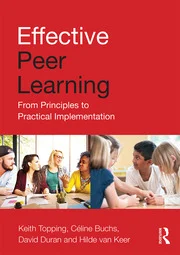542,000+ Visitors Annually!
Menu

Peer learning allows a positive use of differences between pupils, turning them into learning opportunities. Yet education professionals often remain unfamiliar with the principles necessary to guarantee its effectiveness. The aim of this book is to help practitioners establish well-structured and effective peer learning projects using a variety of methods. It introduces and defines cooperative learning (mutual peer interaction) and peer tutoring (directional peer interaction) - outlining general organisational principles that will help practitioners implement peer learning in either of these forms. The authors consider how to prepare and train learners to undertake their roles effectively, and how to organize and monitor the process of interaction as it is happening. They then look at how these systems actually operate in the classroom, exploring how the organizational principles work in practice and giving many practical examples. Subsequently three successive chapters consider how to structure peer interactions in cooperative learning, same-age peer tutoring and cross-age peer tutoring. Finally, the advantages and problems, and the potential and challenges, of peer learning are examined.
Topping, K., Buchs, C., Duran, D. & van Keer, H. (2017). Effective peer learning. from principles to practical implementation. London: Routledge.
Provincial Land Acknowledgement
Contact North | Contact Nord respectfully acknowledges that our work, and the work of our community partners, takes place on traditional Indigenous territories across the province.
We are grateful to be able to work and live in these territories. We are thankful to the First Nations, Métis and Inuit people who have cared for these territories since time immemorial and who continue to strengthen Ontario and all communities across the province.